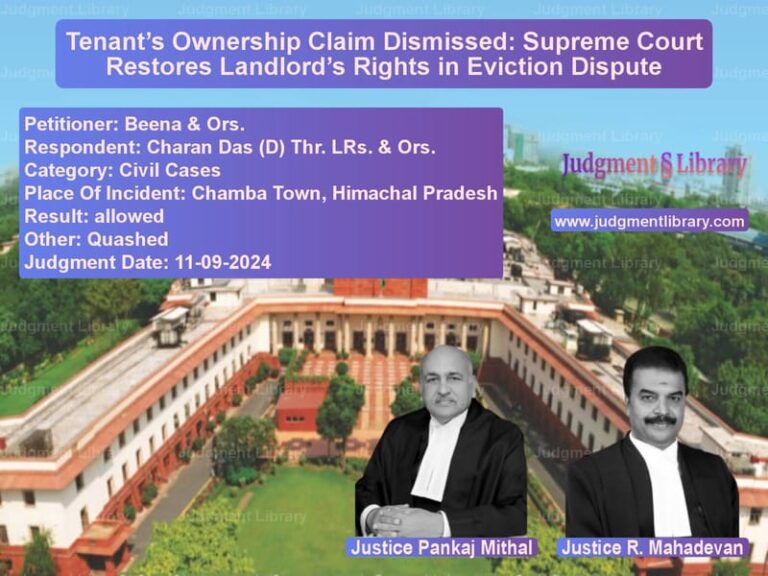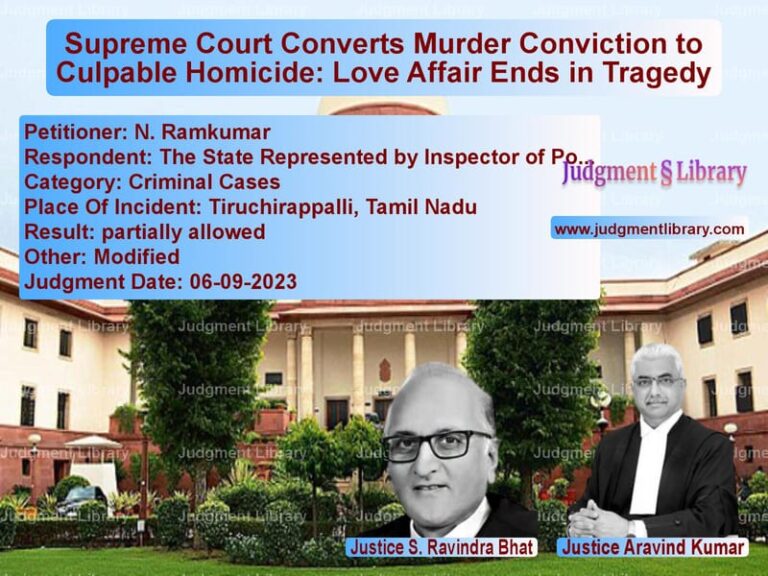Supreme Court Rules on SEBI Regulations: Open Offer and Competing Bids in Corporate Takeover
The case of Digvijay Laxhamsinh Gaekwad (Danny Gaekwad) vs. Sapna Govind Rao & Others is a significant ruling concerning the interpretation of the Securities and Exchange Board of India (Substantial Acquisition of Shares and Takeovers) Regulations, 2011 (SEBI Regulations). The Supreme Court addressed the issue of competing open offers in a corporate takeover and the validity of the appellant’s application under Regulation 20.
Background of the Case
The case revolves around a corporate takeover where multiple entities sought control over a target company through open offers. The primary issue was whether the appellant’s offer was made within the permissible time frame under SEBI Regulations, and whether an exemption should be granted in case of delay.
The key timeline of events:
- September 25, 2023: The private respondents (competing bidders) made a public announcement for an open offer.
- October 3, 2023: The detailed public statement of the offer was published.
- December 9, 2024: The private respondents received approval from the Reserve Bank of India (RBI) to proceed with the acquisition.
- January 18, 2025: The appellant, Digvijay Laxhamsinh Gaekwad, made a public announcement of an open offer.
- January 22, 2025: The appellant filed an application before SEBI to approve the open offer.
- February 7, 2025: The Supreme Court ruled on the matter, addressing the regulatory framework and SEBI’s pending decision.
Petitioner’s Arguments (Digvijay Laxhamsinh Gaekwad)
The appellant contended:
- The public announcement made by the private respondents should be considered effective from January 18, 2025, not September 25, 2023.
- Regulation 20(1) allows competing bids within fifteen working days from the first announcement.
- The delay in obtaining RBI approval for the private respondents’ bid delayed the entire takeover process.
- SEBI should grant an exemption under Regulation 11 of the SEBI Regulations to consider the appellant’s offer valid.
The appellant’s counsel argued:
“The public offer should be the higher of the acquisition price as of September 25, 2023, or the market price prevailing at the time of the appellant’s public offer.”
Respondent’s Arguments (Sapna Govind Rao & Others)
The private respondents countered:
- The public offer was legally announced on September 25, 2023, making the appellant’s offer beyond the stipulated fifteen working days.
- Their deposit of ₹330 crores in an escrow account on September 26, 2023 demonstrated a firm commitment to the offer.
- The appellant’s request for an exemption was unjustified as per SEBI Regulations.
The respondents’ counsel argued:
“The appellant’s offer is belated and does not comply with Regulation 20. The public announcement of the competing offer was made in accordance with SEBI’s guidelines.”
Supreme Court’s Observations
The Supreme Court examined the SEBI Regulations, the timing of the competing offers, and the role of regulatory approvals. Key observations included:
- Regulation 20(1) sets a strict deadline for competing bids to be made within fifteen working days of the first public announcement.
- The role of the RBI approval process did not automatically alter the timeline for the open offer.
- SEBI had yet to make a determination on the appellant’s application, and the Court refrained from interfering in SEBI’s decision-making process.
- Public investors’ rights must be safeguarded, and procedural compliance with SEBI Regulations was critical.
The Court ruled:
“The date of public announcement for an open offer under Regulation 20(1) must be determined as per SEBI’s guidelines. The competing offer must adhere to the prescribed time frame unless an exemption is granted.”
Final Judgment
The Supreme Court issued the following directives:
- The appellant was required to deposit ₹600 crores in cash or bank guarantee by February 12, 2025, to proceed with the open offer.
- The public offer period, which was set to close on February 7, 2025, was extended until February 12, 2025.
- SEBI was instructed to decide on the appellant’s application and exemption request in accordance with the law.
- Aggrieved parties could seek further remedies based on SEBI’s decision.
Conclusion
The Supreme Court’s ruling underscores key principles of corporate takeovers and SEBI Regulations:
- Strict adherence to Regulation 20 timelines is crucial for competing bids.
- SEBI has the exclusive authority to decide on exemptions under Regulation 11.
- Market stability and investor protection remain a priority in regulatory compliance.
- Corporate takeover battles must be conducted within the legal framework of SEBI.
This judgment ensures that corporate acquisitions remain transparent and fair, providing legal clarity for future takeover disputes.
Petitioner Name: Digvijay Laxhamsinh Gaekwad (Danny Gaekwad).Respondent Name: Sapna Govind Rao & Others.Judgment By: Justice Sanjiv Khanna, Justice Sanjay Kumar.Place Of Incident: SEBI Regulatory Jurisdiction.Judgment Date: 07-02-2025.
Don’t miss out on the full details! Download the complete judgment in PDF format below and gain valuable insights instantly!
Download Judgment: digvijay-laxhamsinh-vs-sapna-govind-rao-&-o-supreme-court-of-india-judgment-dated-07-02-2025.pdf
Directly Download Judgment: Directly download this Judgment
See all petitions in Company Law
See all petitions in Mergers and Acquisitions
See all petitions in Corporate Governance
See all petitions in Shareholder Disputes
See all petitions in Judgment by Sanjiv Khanna
See all petitions in Judgment by Sanjay Kumar
See all petitions in partially allowed
See all petitions in Modified
See all petitions in supreme court of India judgments February 2025
See all petitions in 2025 judgments
See all posts in Corporate and Commercial Cases Category
See all allowed petitions in Corporate and Commercial Cases Category
See all Dismissed petitions in Corporate and Commercial Cases Category
See all partially allowed petitions in Corporate and Commercial Cases Category







